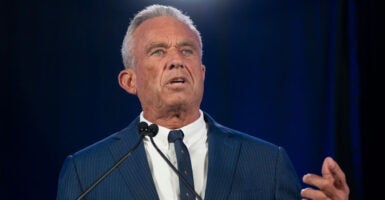Early voting is starting in many states, both in-person and through the absentee balloting process, which makes resolving the issue of Robert F. Kennedy Jr. remaining on state ballots an immediate problem.
Wherever practical, election officials have a solemn obligation to their voters to remove a candidate from the ballot when that candidate has dropped out of the race so their votes aren’t inadvertently wasted if they are unaware of that fact.
That is why the refusal of election officials in Michigan and Wisconsin to remove Kennedy from the ballot is so troubling. A state court judge in Michigan also refused to force the secretary of state to remove Kennedy, bizarrely claiming that “elections are not just games” and that the secretary is “not obligated to honor the whims of candidates for public office.”
“Whims”?! Kennedy has ended his candidacy and is no longer running for president. Voters have a right to be fully informed of this when they are voting. That includes not being given the opportunity to waste their ballot by voting for a candidate who remains on the ballot due to the “games” the partisan secretary of state in Michigan is playing, even though that candidate is no longer in the race.
But even in states that claim it is “too late” to remove a candidate from the ballot and that it will be too expensive to redesign and print new ballots, election officials have a duty to inform their voters that a vote for a candidate like Kennedy, whose name remains on the ballot, will be a waste of their valuable franchise. And there is an easy and relatively inexpensive way to do that, which can be accomplished quickly and without any delay.
States that are not going to reprint their ballots with Kennedy’s name removed should immediately do two things.
First, election officials should prepare a one-page, short notice on their official letterhead that says something like:
IMPORTANT NOTICE TO VOTERS: Robert F. Kennedy Jr., who is listed on the ballot as a candidate for the office of President of the United States, has dropped out of the race and is no longer a candidate. Due to the late notice of his ending his candidacy, we were unable to prepare new ballots without his name. All voters should be aware that a vote for Robert F. Kennedy Jr. will be a vote for a candidate who is no longer running for office.
A copy of this one-page, simple, easy-to-understand notification should be enclosed with every absentee ballot that is mailed out to every voter in the state who has requested one or is otherwise being sent one.
How quickly could this be done? It took me about five minutes to compose this message, and I could easily have thousands of copies printed by any commercial photocopying or printing company in one day. And those same companies could continue printing this notice as needed for each day that absentee ballots are being sent out.
Second, election officials should create signs with this very same notification for posting prominently inside every polling location used in a state for both early voting and in-person voting on Election Day. Designing and creating such a sign can be easily and quickly done; and getting copies printed, again, by any commercial concern (or in-house in counties with printing facilities), could obviously be done with almost no delay.
That is particularly true because only a small number of such signs will initially be needed since only a very limited number of polling locations are open for early voting in all of the states that allow early voting. Election officials will then have two months to prepare such signs for all of the polling places that will be open for in-person voting on Election Day.
Sending notices to absentee voters and preparing signs for in-person voting should be a secondary plan, however. Election officials should make every effort to reprint new ballots that correctly list the candidates actually running for office. But there is an obvious solution that can be used to adequately inform voters even if that is not possible.
Any refusal by election officials to, at a minimum, prepare such notices will be a violation of their duty as public officials to fairly and honestly administer the upcoming election. Given the ease of this solution, it will be hard to imagine any refusal to implement it that is based on anything other than election officials engaging in partisan misbehavior that is intended to misinform voters and manipulate the results of the presidential election.
Election officials who engage in that type of misconduct are betraying the public trust and should not be in office.































